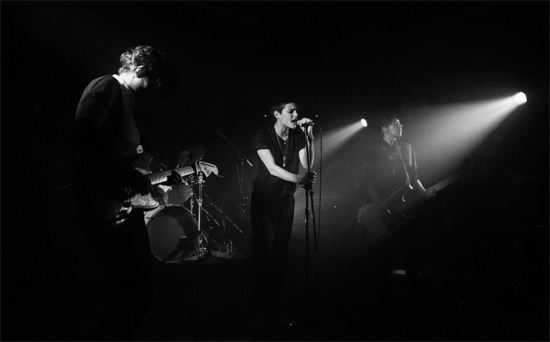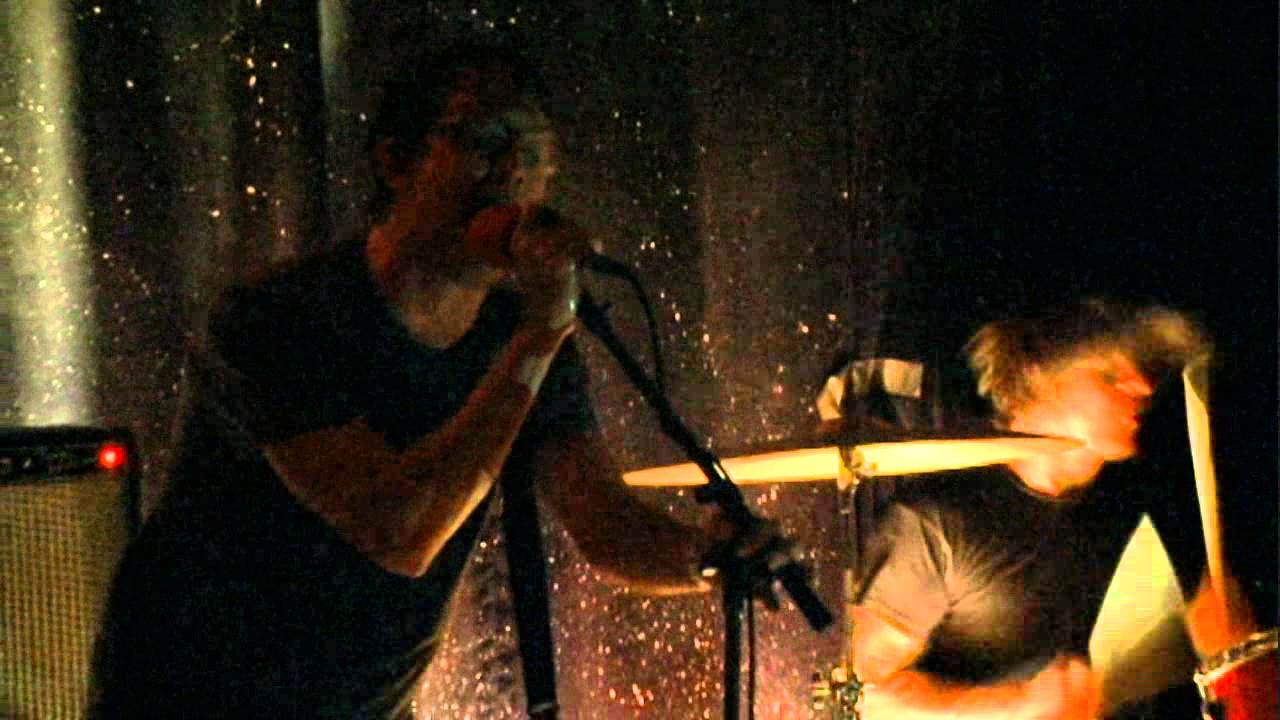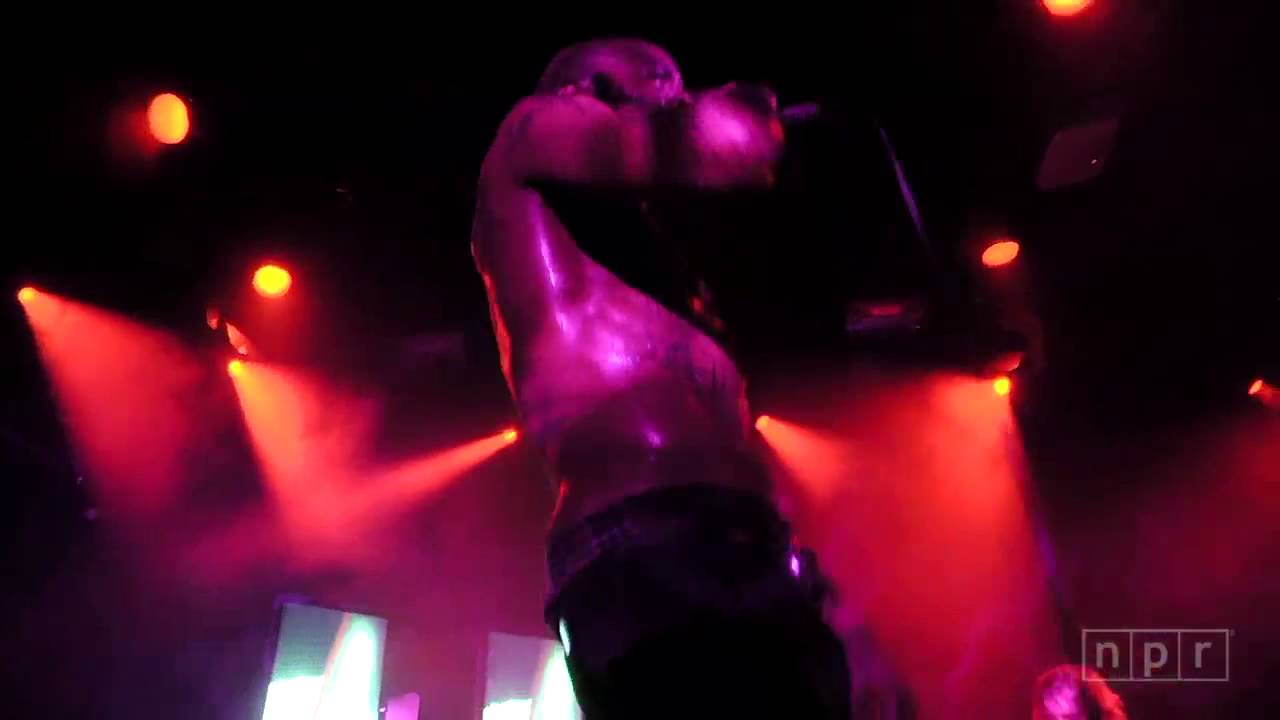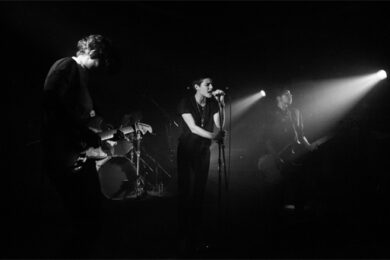"CMJ is so fucking stupid." We’re just so over it. When I was spending my Saturday afternoons working at an all-volunteer, all-punk record store in high school, it was a posture. A pose. I wanted to know why abrasive, nihilist-leaning sounds meant so much to me, and so much to everyone around me in the baseline-for-medium city I’m from. And I wanted to see what they were wearing. I didn’t know anything. I wanted to know why an official-sounding thing like Lumberjack Distribution seemed so important to North America’s interconnected community of independent fans and proprietors. What’s a distro? I wanted to be able to say, at a later date, that I did this thing that was cool, and that I had proved I truly cared about punk and hardcore and never ate Taco Bell and read books and had heard of Fluxus and Crass. I already had a tattoo.
By Way of Introduction
CMJ, the annual five-day music and music business festival based in Manhattan and (mostly) west Brooklyn, is too stressful to be enjoyable, too attended and attentioned to be truly underground, too chaotic to be organized, and too spread out to be considered any sort of proper festival – especially considering that any given day in New York (or any other mega-major metropolis) offers about the same opportunity for musical discovery, and that every venue in New York, whether officially aligned with the originating institution or not, lists that week’s shows with the prefix ‘CMJ.’ It’s a fucking shitshow, and many are over it. (And I’m not the only one who recognizes it)
If nothing else, the CMJ Music Marathon – originally named for an actual, less physically draining marathon you may have heard of that takes place around the same time – always serves as the rough draft for an imminent critical mass. This year it appears that Savages, Foxygen, METZ, Port St. Willow, Angel Haze, Icona Pop and two or three others can safely be declared the parallel winners of the hype race, as a quick Google will prove out. These are bands with managers and publicists and well-stocked labels behind them. Depending on where you’re standing, that means everything. Or nothing. It depends.
Trust Your Ears
The first night of the damn thing was a simple resolution: to see METZ, whose self-titled debut on Sub Pop has raised a steady rattle to my head for the past several months. They were booked at a venue located in the back of a restaurant, with a shaggy dog piece of yarn art hanging delicately above the stage.
After a slew of openers aping a wide rage of artists, from The Cure to Depeche Mode to Echo and the Bunnymen – excluding Baltimore’s Roomrunner, who brought their own serrated zest of equal parts buttrock and stoner fray – METZ took the stage to a packed room of early adopters. The scene at their show two days later will be less forgiving to late arrivals, as I’d find out. They’re a band that knows exactly the fuck, forcing the contours of post-punk by the ear to its logical conclusion (complete cacophony) and bringing it back just long enough to throttle it dead and say “thanks" and play the next number. The singer and guitarist, Alex Edkins, is a professional-quality madman and a baptismal force for those inclined to dip their heads.
Writing about anything for an extended period of time means you end up second-guessing yourself often – "Is this [insert your beat here] supposed to be good? Because I’m not seeing it." After a night of lugubrious journal entries swaddled tenderly in reverb, METZ was the sort of thing that affirms your tastes haven’t been worn down completely under a constant tide of critical engagement. I am not an agate. As one fella put it, absolutely: "THAT WAS SO FUCKIN’ COOL."
The following evening, after a day spent reporting on panel discussions and their distinct blend of disheartening rhetoric and behind-the-curtain navel-gazing, I find myself rubbing up against a problem I’ve unsuccessfully dealt with since I first started writing about music. That is: how do you write about friends? The ideal answer, from where I’ve sat, is that you don’t. My roommate of three years and his bandmate made the drive to New York to play three shows with their band Bloodnstuff (they know, they know), and I made a stop to see them. So what happens when you can’t extract whether you like a band because you want them to succeed and care a great deal about them and know exactly where they’re coming from, or because they’re actually good? Trust the ears, because the brain isn’t listening.
Don’t Fight a Good Thing
Buke and Gase, the Brooklyn-based (get used to that hyphenate) duo of Arone Dyer and Aron Sanchez – yes, two phonetically identical names – are just fucking adorable, aren’t they? Look at them.
At the group’s only scheduled show of the week, NPR Music’s “unofficial" showcase at Le Poisson Rouge, the two sat at a three-quarter angle to one another, all eyes and smiles and timing nods. Arone’s immaculately crisp, gymnastic birdsong of a voice is free and focused, and at the most demanding moments her face is forced to ascend into a smile, and you notice the hearts she’s carved into her buke. Because of how their instruments have been constructed, Arone and Aron’s compositions rely on the other – the melodies require both of them present in order to exist, and it’s a beauty of a thing to have work in front of you. I’ve never read mention of their debt to The Kills, especially in the steadfast stomp their minimal rhythm section (a kick drum operated by Aron and some pedaled shocks and tremors from Arone) affords – and I couldn’t help thinking it was an imprisoning force upon music that’s so rhizomatic otherwise.
There was nothing but a flat sine in my head as I walked out of the room. It was teeth-gritting, flaying and frustrating, euphoric and mean-spirited. “That was the best set I’ve seen in 2012," said A Tribe Called Quest’s Ali Shaheed Muhammad, the night’s DJ and concrete between the bricks, after Death Grips had finished their set. They took the stage, MC Ride pre-de-shirted, and began ‘Come Up and Get Me’. There wasn’t a song break for the duration, you could find maybe two to three seconds during the tech-séance when you weren’t being repeatedly tumbled about the face by Zach Hill’s eye-crossing drum work and MC Ride’s conjuring spasms and open-throated bellow.
Ride’s body is such an important part of their show – doubly so here since the recorded vocals were so well out in front of the live – the cryptic, Crowley-alluding tats and straining muscle, shiny sweat, closed eyes, perpetually hailing stars and dropping bombs. There’s an anger at, and an embrace of, the spotlight that seethes off of Ride, an artist who seems stuck between a desire to cast a spell and take a shit on the fire necessary to do so. So concluded the hardcore section of this year’s CMJ.
Shit Sound Means Shit Bands, Pt. 1
Port St. Willow, the stage name of Brooklyn-via-Portland’s Nick Principe, was in a dark basement on a sunny afternoon. It was, decidedly, a step down from their show at Stereogum’s showcase the night previous, which had gotten a lot of shake from the shock of Savages on Americans, as well serving as a proper introduction to many to the work of Port St. Willow. On record Port St. Willow sounds like an impossibly competent and elegant Bon Iver 2.0 Lite, all tributaries taking their time before reaching the ocean and everything in its right place and such. In the basement of the Cake Shop it sounded like the concrete itself was playing the music. While Principe’s lovely coo was still lovely, all of his carefully laid nuance was left to bounce into infinity like a dangling electron.
Same for another Brooklyn-based project, Sinkane, who played in a cleared-out teahouse that same afternoon. On record Ahmed Gallab’s music is an exciting balance of African folk, psych, disco – but all of that compelling dynamic was lost in the otherwise pretty space near the East River.
This is an epidemic at CMJ: a lot of the music you hear is going to be encapsulated by a shit venue, and shit venues make shit sounds and good bands don’t sound good swimming in shit. Simple, right? But remember: nothing is simple in the MUSIC BUSINESS.
You’d Think That Packing Pig Destroyer Fans in Like Sardines Would End In Murder, But You’d Be Wrong
Pig Destroyer, that reigning grindcore obelisk, were celebrating the release of Book Burner, their fifth full-length and first since 2007’s incredible Phantom Limb. Since it was the band’s only booking, which are relatively rare anyways, the venue decided to flout some capacity standards in order to accommodate as many fans as possible – all of whom are sweaty, sweaty giants. There was a mosh pit before the band even started playing. And while I, along with my friends, thought that the knob-adjusting Blake Harrison came off as goofy while the other three were, y’know, doing stuff, there was no disagreement that it was an absolutely singular, physically enraging experience. There’s probably no worse, and so no better, time to see Pig Destroyer than during a festival like CMJ.
Not Everyone Can Do What They Do
Only a band as good at what they do as Pissed Jeans could get away with not giving half a fuck so, so, so hard. Have you ever seen a guitarist use a piece of pizza as a pick? Have you ever seen a singer pick up a discarded guitar, unplug the bassist’s line mid-song and giving him an excuse to exit stage left, then rock out so horribly that it’s forced to be amazing? Have you ever seen a show end with the drummer wearing a frozen, dopey smile, playing the same four-hit beat for about fifteen minutes, the sound guy just laughing and shaking his head? For people of a certain disposition, Pissed Jeans is it. I’m one of them.
[Attached image – Matt of Pissed Jeans playing two guitars at the same time. It’s not a great picture even by iPhone standards, so if you don’t want to use it I can’t blame you]
Technology: The Great Fulminating Zit on the Ass of Modern Existence
Computer problems will fuck you up. Your umbilical cord is cut, no nutrients coming nor waste issuing. Just the paper and pen and the legal-yellow glow of your phone’s notepad. For every minute you’re off, you’ll have to make it up on… because you know you’ll be coming back, even though every thought during the slow unraveling of your clean, mediated mental life has something to do with smashing things, and logging trees, of giving up, on the pointlessness of This, of buying a pickup truck and heading to Maine or eastern Washington.
But you get on the subway, and walk through the rain – all those half-thoughts still steeping – and listen to the genius say it’ll be all better by this evening, less a few months of precious, precious accumulation.
And you read shit like this sipping a restorative beer in a pizza parlor, and wonder on the why of it.
Hearing ‘Sonic Reducer’ for the first time. When electronic art ceased to be a conspiracy. White Magic in a forest in Fall.
I went to the store to pick up my shaken Etch-A-Sketch of a computer and lo, a band was playing. What a pleasant surprise this was. Their name is Ponderosa – label mates to Kris Kristofferson and Dwight Yoakam, I learn later – who self-describe as a “neo-psychedelic indie rock band." Ponderosa plays plugged-in Fleet Foxes covers of its own creation, and that’s just fine with me. Fine, just fine.
My CMJ badge got me three free beers, so the day wasn’t a total wash. I washed in the rain.
Shit Sound Means Shit Bands, Pt. 2
After my compocalypse – the loss of quite a lot of work and the need to make up for it, not to mention a general malaise at the prospect of, well, everything at that point – I sighed, sipped scotch from a flask, and walked to The Acheron, a bar and venue on the western edge of my neighborhood. Archeron is a brick box slid in satin black, about 10 feet wide and forty or fifty-odd long. I was there to see a triple-threat scum-sludge lineup that promised a bit of release: Vaz, Pop 1280, and Slug Guts. All three of them, in their own shaded ways, are cut from the cloth of no wave and post-punk and resin hits and are better than good at wearing it out on the town. Unfortunately, these bands were, as Sinkane and Port St. Willow before, ruined by shit sound. And what does shit sound mean?
Let’s Talk About Savages
I feel unnecessarily bright and hopeful as I ride the train on an unseasonably warm and vibrant Saturday afternoon to the Lower East Side. It’s my last chance to catch Savages, so I show up two hours early, knowing well the attention directed at them over the past week will make seeing them a task.The room is so overpacked when I arrive, as Foxygen are ‘tearing it up,’ that people are dribbling out into the bar, blocking the natural ebb and flow of human beings into and out of the space. But, finally, as the crowd from Foxygen files out, I make my way into the room, a steady stream of people behind me slowly closing off any route to escape or urination. If you wanted to use your phone, you had to hold it about two inches from your face, so at deficit was the personal space in the room.
The four women who comprise Savages, along with a sharp-suited gentleman and an impossibly thin and impossibly appropriately t-shirted (Bauhaus) man, cut through the middle with impatience, obviously a bit crazed from their not-quite-a-marathon run of the city over the past four days.
They set up relatively quickly, the suited man on stage chatting with singer Jehnny Beth (a burgeoning style icon!) and sharing what must have been an exceptionally strong drink, if their faces post-sip were any indication. After watching the footage of their performance on Jools Holland, I was abnormally excited for this performance. What little I know of their music appeared immaculate and minutely considered at first blush, their influences clearly marked and their own flourishes plain – “European" was the term Mr. Turner used. And so it was: just so, like a four-piece jigsaw of black pieces with pewter hearts on a shivering woofer… compelling and charismatic and confident, a sort of post-goth attack I didn’t know I’d been waiting for. I had no idea what Beth was saying, but I believed it to be perfect. And so it was. We pin a lot on our idols, maybe the new ones more than most.
Before the show, Beth asked the suited man: "On or off?" "Off." She played the show sleeveless.
So, in the End, I Learned What It All Means
After all these years, I’ve learned precious little of the true magic behind music. I know plenty about its components – timbre, managers, ear-perking dynamics, mastering, merchandise, subtle distinctions of genre that mean nothing to everyone, obscure touchstones, optimal body placement at a gig, adjective objectivity – and this can go a long way sometimes. But however much you know about the exoskeleton, it’s impossible – actually impossible – to capture or understand that magical keystone and its subjective dependents, holding strong for all the subsequent window dressings. It’s the millions of goose pimples it raises daily. The gooseflesh is the reason I find myself not giving a shit about whether or not the singer in a band asked her manager about whether or not she should don a jean jacket during a show. It’s the reason I’m ready to leave when shit sounds like shit, the reason I’m more than willing and usually quite excited to drag my ass from one place to the other, wading through monumental piles of bullshit all the while. The reason I was behind the counter at that goddamned amazing record store. It’s still standing. We’re the posture, and magic doesn’t have vertebrae.







